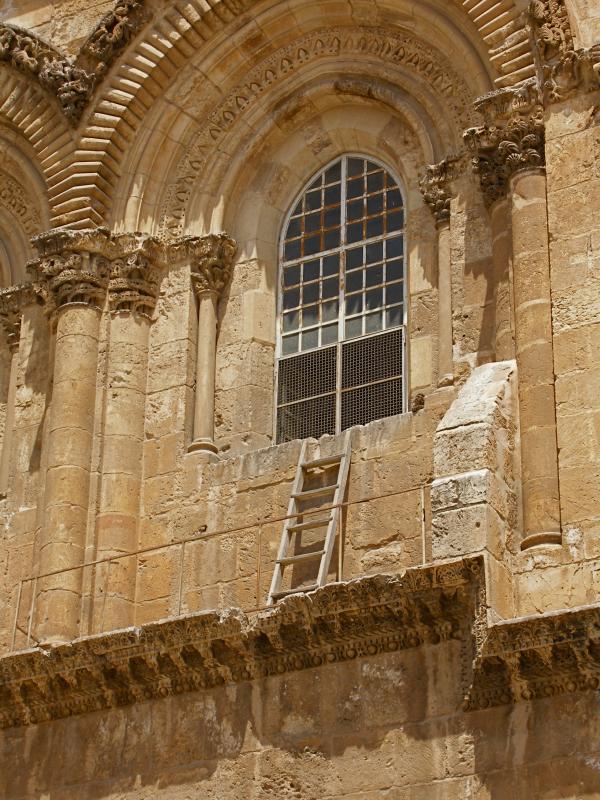 One of the most important holy sites of Christianity is the Church of the Holy Sepulchre in Jerusalem. It's believed to be built atop the location where Jesus was crucified, as well as the cave of his burial and resurrection. Like everything important in Jerusalem, control of the church has been a hotly contested issue for centuries, with the various major Christian denominations fighting (sometimes via literal combat) for administrative authority.
One of the most important holy sites of Christianity is the Church of the Holy Sepulchre in Jerusalem. It's believed to be built atop the location where Jesus was crucified, as well as the cave of his burial and resurrection. Like everything important in Jerusalem, control of the church has been a hotly contested issue for centuries, with the various major Christian denominations fighting (sometimes via literal combat) for administrative authority.Back in the 600s, Caliph Omar, one of the companions of Muhammad, was invited by the Christian Patriarch to pray inside the church. He declined and instead prayed a nearby so as to preserve the church's status as a Christian holy site. This precedent meant that the various Muslim authorities who would rule Jerusalem for much of the next 1400 years were often neutral arbiters, forced to settle the disputes of the various Christian factions.
Early on, control of the front door was given to the local Muslim Nusaybah clan, who are to this day (along with a second family, the Joudeh) in charge of unlocking and opening the gate every day. Meanwhile, the inside the church has been the site of fierce and violent battles for control of the various holy sites. Monks of the various orders fought each other with stones and staffs, and bribed and cajoled the Muslim authorities to take sides. In 1757, a mob of Greek Orthodox launched a surprise attack to take over the entire building. The Catholic Franciscans barricaded themselves inside, but were eventually overrun and thrown out.
The conflict nearly grew to a major war in 1853 when Napoleon III of France demanded that the Ottomans restore the pre-1757 arrangement, but Tsar Nicholas I of Russia threatened to invade the Ottomans if they did so. The situation was defused (if one can call it that) by an Ottoman decree that the present status quo would remain in effect, and could not be changed. The Greek Orthodox Church would possess the majority of the power, while the Catholics and Armenians would hold smaller responsibilities. The Coptic, Ethiopian and Syraic Churches also have minor authorities.
The adherence to this status quo is so strict that even trivial changes require the approval of all parties involved. Because everyone refuses to get along, this tends to result in failure to accomplish the most minor of tasks. One of the most notorious is a small ladder, which was resting against a window at the time of the Ottoman decree. Because the window ledge is common ground, moving the ladder would require the approval of all six of the orders. It has therefore remained propped against the window for over 150 years. (It was moved briefly in 1997, probably without authorization, but quickly replaced).
In 2002, eleven monks were hospitalized after a Coptic monk moved his chair into a few feet into the shade, the Ethiopians disapproved, and a brawl broke out. Theologians agree this is almost certainly what Jesus would have done.
No comments:
Post a Comment